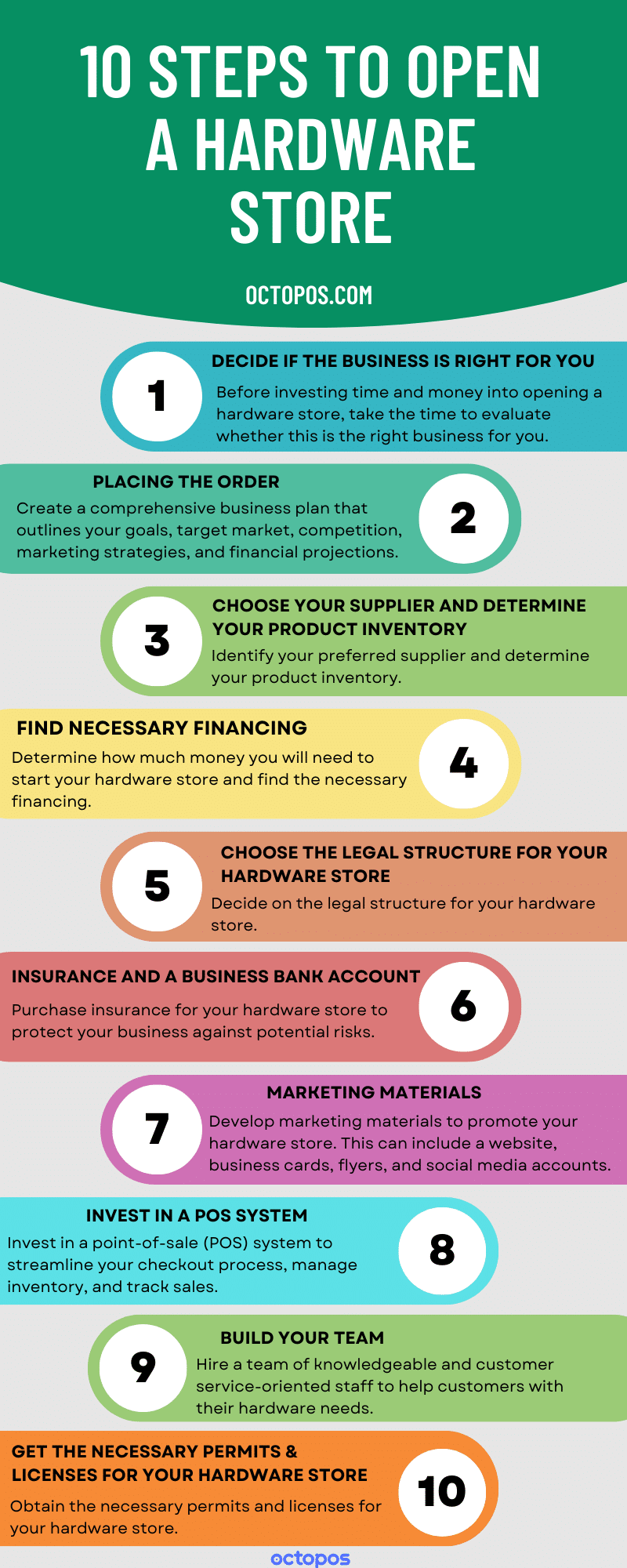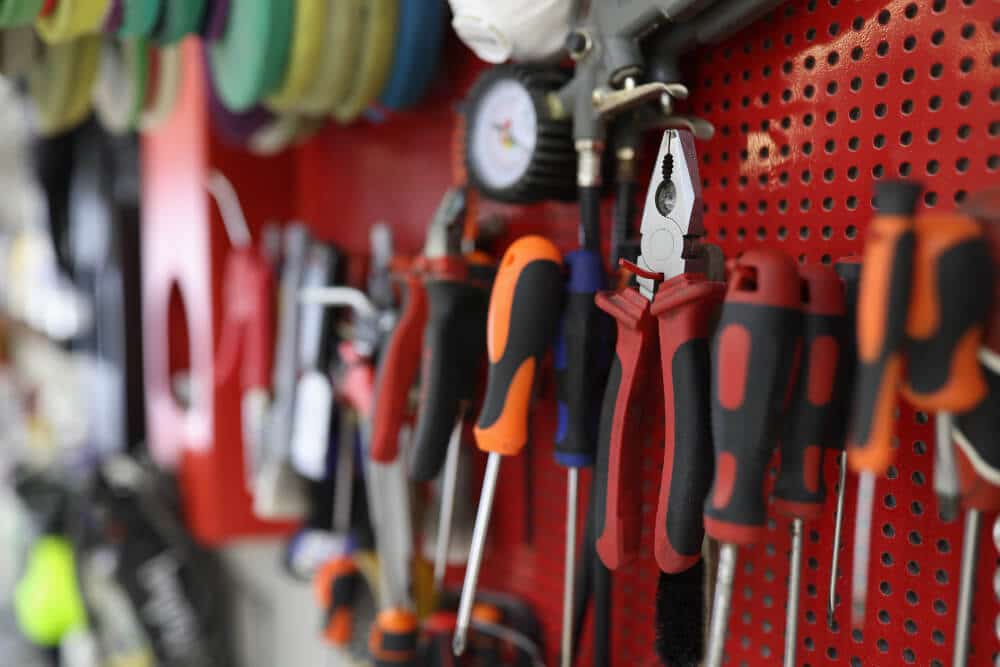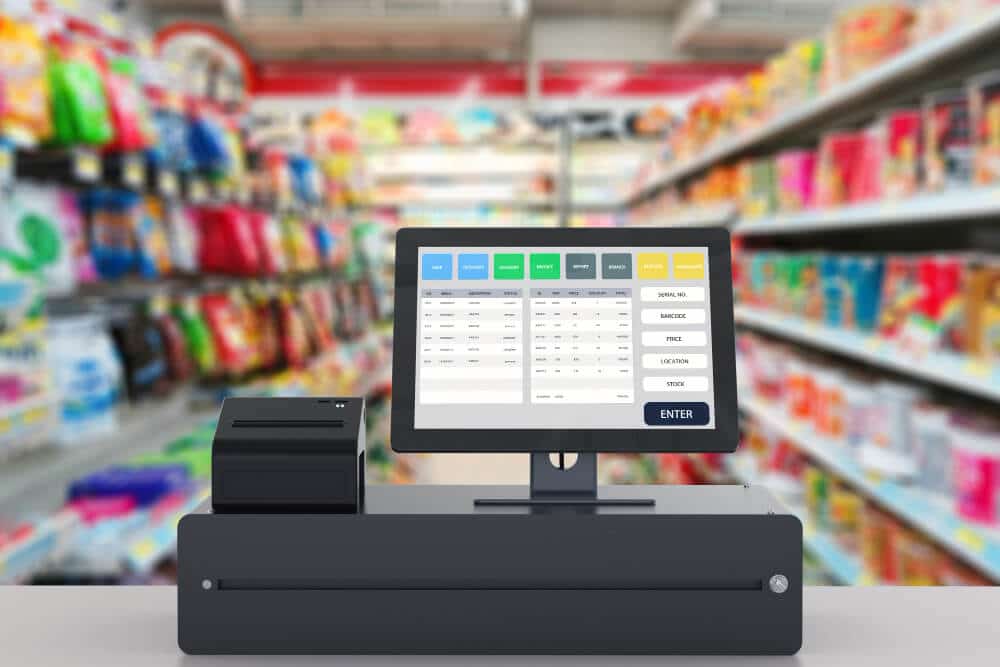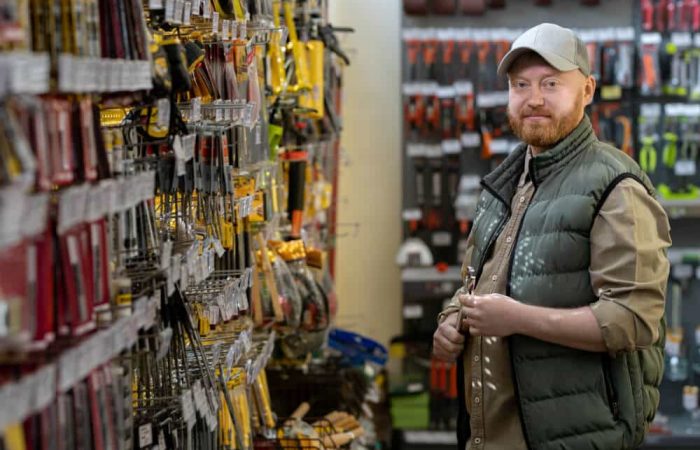A hardware store is one of the lucrative businesses you can start targeting your local market. typically, a hardware store sells building materials, hand and power tools, locks, keys, fasteners, chains, hinges, housewares, cleaning products, plumbing supplies, electrical supplies, paint, and utensils. These stores are usually designed for handymen, DIY customers, and traders who are looking for a place to source their supplies.
Just like a grocery store, starting a hardware store begins by understanding the kind of business you are entering. Before opening a hardware store, you need to understand the kind of items you will be selling, the expectations of your customers, and how to make the business profitable. In this article, I am going to share 10 essential steps in building a profitable hardware store business.
Table Of Content
Decide if the Business Is Right for You
Write a Business Plan
Choose Your Supplier and Determine Your Product Inventory
Find Necessary Financing
Choose the Legal Structure for Your Hardware Store
Get the Necessary Permits & Licenses for your Hardware Store
Insurance and a business bank account
Marketing Materials
Invest in a POS System
Build Your Team
10 Steps to Open a Hardware Store

Decide if the Business Is Right for You
The very first thing you need to do is to decide whether a hardware store is the right business for you. Depending on the nature of your local community, you may find many opportunities for your hardware store. Essentially, independent and smaller retailers tend to succeed in tightly-knit communities and areas that are community-oriented. However, if you are based in a suburban or urban community, you are more likely to succeed by starting a brand name or franchise with large-scale operations.
Write a Business Plan
Once you have decided that is the right business for you, you will need to create a business plan. The plan will help you map out the specifics of your business, including your target market, startup and ongoing costs, the name of your business, and how much you will be charging your customers. You will also be able to determine how much profit your business is likely to make and your growth prospects. A business plan simply shows how your business will make money and succeed.
Essentially, starting up a small hardware store may cost less than $100,000. The major costs will include rent for the building, display setup, start-up inventory, insurance, and cash reserve for labor costs and staffing. After launching the business, expect to incur ongoing expenses such as supplies, utilities, rent, and insurance. Once it is operational, you can expect operative profits of between 1.6 and 6% with 3 – 7% net profit before taxes.

Choose Your Supplier and Determine Your Product Inventory
Your supply chain is a major consideration before opening a hardware store. You need to determine where you will source your products and how they align with the needs of your customers. Whether you aim to start an independent tools shop or a franchise hardware store, managing a productive and efficient stock should be a major focus.
Most of the time, hardware shoppers are looking for materials to use later that day. Therefore, stockouts can be frustrating and lead to loss of customers. To ensure you meet the needs of your customers and your hardware, establish sold supplier relationships and implement a strong inventory management system. Your hardware should be able to meet emergency orders, generate lines of credit, and offer promotional and bulk pricing efficiently.
Find Necessary Financing
To start a successful hardware store business, you will need some decent cash. As highlighted before, you will incur start-up costs and the cost of running the business. These may push the cost of financing the new shop to hundreds of thousands of dollars. The cost may even exceed $1 million if you decide to open a big franchise.
Finding the necessary financing is a critical step in starting the business. While some entrepreneurs are lucky and able to fund the business alone, many small business owners usually need to seek financing elsewhere. Take time to analyze the amount of funding needed to start the business. You can come up with this figure by calculating the amount needed for rent, initial inventory, the cost of retail equipment for your brick-and-mortar location, and hiring initial employees.
Common sources of finance include influential business owners in the area who are willing to support and contribute to the growth of a strong community. Consider running your business plan by the local Small Business Administration office to help you secure the necessary finances and paperwork. You may also approach local banks and other financial institutions for a business loan, check on your savings, and talk to friends and family about supporting your new business financially.

Choose the Legal Structure for Your Hardware Store
The most common legal structure types include sole proprietorship, partnership, limited liability company (LLC), and corporation. The choice of a business structure for your hardware should be guided by how much control you want to have and the attached financial responsibility. For instance, establishing a legal business entity such as a corporation or LLC will protect you from being held personally liable if your hardware is to be sued.
The most common legal structures that hardware store owners choose are LLCs (Limited Liability Companies) and LTDs (Limited Companies). While an LLC is owned by the original founders of the business, an LTD is owned by shareholders. Understanding the differences between an LLC and LTD business structures can help in making an informed decision and choosing a structure that will serve your needs better.
Get the Necessary Permits & Licenses for your Hardware Store
Any business will only remain in operation if it is registered and registered with the necessary agencies. Failure to get the necessary permits and licenses can lead to hefty fines or the possible closure of your business.
In most states, you will need to obtain a Hardware Store license before opening the doors of your business. You will also be required to apply for a resale certificate that allows a retailer to purchase goods mend for resale without paying sales tax. Without this certificate, you will e required to collect sales tax on all the goods you sell in your hardware store. To apply for the relevant permits and licenses, you can visit your town, city, or county clerk’s office. You may also seek assistance from local associations listed in the directory of local business resources listed on the US Small Business Association website.
You will also need to register for several state and federal taxes before starting your hardware business. Registering the business will allow it to operate fully, and file taxes with the city, state, and federal governments. Other benefits of registering a business include opening a business bank account, creating lines of creating, and building vendor relations for a reliable and efficient inventory supply chain. Start by registering for taxes by applying for an Employer Identification Number (EIN) from the IRS website. Then, depending on the business structure that you chose, you will have different options on how it will be taxed. For instance, some LLCs benefit from being taxed as an S corp (S corporation).

Streamline your business with Octopos– A Complete POS System with Big Boys Tools without the Big Price
It is a lot more than a point of sale. Octopos is easy and intuitive for you and your staff to use. Yet you get all these sophisticated tools to manage inventory, track and engage customers, get meaningful insights into your business, and much more.
Insurance and a business bank account
Fund management is an essential aspect of the success of any business. On the same note, having dedicated business banking and credit accounts will protect your personal assets, help you build your business credit, and make accounting and tax filing easier. On the other hand, insurance ensures that your business is operating safely and lawfully.
Mixing your personal account with that of the business accounts are mixed puts your personal assets including your home and car at risk if your business is sued. This business concept is called piercing your corporate veil and means that your personal property or assets can be used to pay off your business debt. In terms of building business credit, different credit cards for your business as a trustworthy “person.” By getting credit cards in your business name, you can benefit from higher lines of credit, better interest rates, and more.
Business insurance protects the financial well-being of your hardware store in the event of a covered loss. The choice of insurance coverage to purchase will usually depend on the different risks your business is exposed to. If you are unsure of the kind of risk your hardware store may safe, start with general liability insurance. This will cover more of the risks that small businesses face, making it a great place to start when insuring your new business.
In addition to protecting your business, you will also need to insure your employees. Workers’ Compensation Insurance is a notable insurance policy for many businesses that ensure the safety of those working in the company.
Marketing Materials
For your Hardware store business to grow and attract more clients, you will need to brand it. Branding refers to what your business stands for and how it is perceived by the public. Therefore, you will need to create a strong brand that will help your business to stand out from competitors. You can start by creating or hiring a freelancer to design a business logo for your hardware store and choosing your theme colors before getting into active marketing.
When it comes to promoting and marketing your brand, you will find several approaches useful. It is important to understand that a hardware store mainly depends on local businesses from the community. Getting new customers will usually involve networking with existing contracts and using them to spread the word through local advertising. You may also partner with other businesses, such as asking local restaurants and other retail stores to help in spreading the word about your business in exchange for a discount on products in your hardware store.
An important aspect of marketing is ensuring the customers keep coming back. Most businesses thrive more by having more return customers than by trying to acquire new ones. You can differentiate yourself from the competition through specialization and offering a unique company culture. For instance, you may set up a website, gather the names and email addresses of your customers, and send them weekly DIY tips. The tips can be based on your own experiences or general knowledge but will keep your business at the forefront of your customer’s minds. Whenever they need something, they will tend to think of your hardware store first.
Another way of retaining your customer is by running a loyalty program. A great customer loyalty program is an essential aspect of your marketing plan that can be used to draw potential customers while encouraging repeat business for those who have shopped with you. With a reward program, you can encourage customers to spend more and shop more frequently. Implementing a simple point-based loyalty program or investing in a more powerful membership program will see your hardware store close more business.
Invest in a POS System
Investing in an advanced hardware store POS system will help in maintaining optimal inventory in your store. A good POS system includes an inventory management system, customer relationship management, orders management system, and product performance reports. These tools will help in providing direction to your business and increase sale volume.
While looking for a good POS system, aim to acquire cloud-based points of sale. This will ensure greater data security while increasing efficiency and convenience in order management. You will also have access to more advanced features such as retail detailed product analysis that provides an extra level of information for your business.
Build Your Team
For your hardware store to meet its targets and succeed, you will need to hire a great team. Focus on getting knowledge and passionate employees on your time. When a shopper enters your store, they will be interested in specific items or tools. This also means they will often come with questions, which can be technical at times. A shopper may also be apprehensive about asking if they feel over their head.
With a great team, you will be able to address the specific needs of your customers and make them feel satisfied with the service offered. A great team is welcoming, smoothly interacts with customers, and is efficient in educating each shopper about the products and procedures. When you are hiring, look for people who are naturally interested in the products you are selling and who are eager to learn more. Look for knowledge, passion, and great energy.
The Bottom Line
Although opening a hardware store sounds easy on paper, it requires taking several measures. While the process starts by deciding whether this is the right business for you and developing a business plan, a lot goes into acquiring resources and building a supply chain. Before opening the doors of your new shop, make sure you have enough funding, have identified your key suppliers, developed a marketing plan, and built a great team. In the end, you want a clear business process from acquiring your products, popularizing your business, and serving the needs of every walk-in customer.

